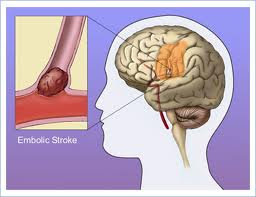Embolism:
It refers to a condition in which there is complete or partial occlusion of some parts of the cardiovascular system (e.g, arteries or veins) by impaction of some mass (embolus) that has transported to the site through the bloodstream.
Emboli:
It refers to the mass that occludes the blood vessels and is transported to the site of occlusion through the bloodstream.
Classification Of Emboli.
(A) Classification According to consistency.
1. Solid Emboli
for example
- part or whole of dislodged thrombus
- Atherosclerosis debris that is cholesterol emboli.
- Tumour fragments
- bits of bone marrow
- Foreign bodies that gain entry to the bloodstream for example bullet.
2. Liquid Emboli:
for example
3. Gas Emboli
for example
- Nitrogen bubbles (caisson disease)
- Air that enters with IV injection.
(B) Classification according to the site Of Origin.
(C) Others types Of emboli
- Saddle Embolus: it refers to that embolus which lodges itself at the bifurcation of the main pulmonary artery.
- Paradoxical Embolus: It refers to embolus that passes from the right side of the heart into the left side of the heart through the inter-atrial or inter-ventricular septal defect.

Comments
Post a Comment
Post Your Reply and Give Your Opinion About the Post